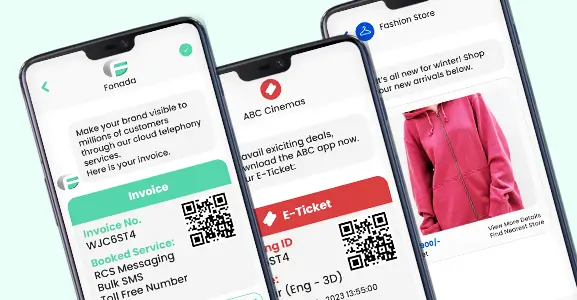Businesses can use a cloud call center software to manage the customer experience via text, email, phone calls, and social media. In addition to initiating and receiving calls, this software provides advanced features for managing all inbound and outbound calls for a business.
A cloud call center solution enables businesses to track every customer request and increase agent productivity by supporting more digital channels.
This post explains cloud call center, difference, work operations and their key benefits.
What Is Cloud Call Center?
A cloud call center, or cloud-based contact center is a communication hub that controls all inbound and outbound phone calls, text messages, social media, outgoing voice calls, and video chats from a central dashboard. The contact center supplier will provide and manage all hardware, servers, and maintenance. Unlike a PBX, it does not need expensive hardware or consultants to manage.
It is necessary to integrate a cloud call center with all of your media platforms to get started. The cloud contact center will integrate with your CRM system so that you may access and update customer data as needed.
A cloud call center operates entirely online, so you need to provide your staff with headsets, workstations, and an internet connection. When agents log on, they may receive calls, emails, or text messages, engaging customers across various channels.
Difference Between Cloud Call Center And On-Premise Call Center
Reliability
On-premises call centers may have more reliable technology to reduce call lag and lower call quality. However, the call quality of an on-premise call center is only as excellent as its technology and infrastructure. On the other hand, cloud call centers provide excellent call quality when organizations have reliable and robust internet connections.
Integrations
Integration of an on-premises call center with other services is difficult but possible, mostly due to licensing and installation requirements. Integrations and implementations go more smoothly at businesses with top IT teams.
Features
On-premises call centers provide standard, expected features such as transfers, hold, music on hold, conferences, and call logging. While cloud call centers offer the same standard functions as traditional call centers, they go beyond them by integrating cutting-edge features like smart IVRs, click-to-call, and live call monitoring.
Cost
When deciding between an on-premise contact center and a cloud call center, you must decide whether they prefer capital expenditures or operational costs. On-premise contact centers need up-front hardware, licensing, and server housing costs. In addition, onsite installations are necessary every 5 to 10 years as hardware ages and technology advances.
As long as your organization has a reliable Internet connection and enough bandwidth, cloud call centers have no infrastructure or hardware costs. The ongoing costs include a monthly subscription.
Setup
Implementing an on-premises contact center may take many months since organizations must set up the infrastructure, find compatible software and obtain hardware and license. However, cloud-based call centers must install a preconfigured program on a computer.
How Does A Cloud Call Center Work?
Cloud call centers provide omnichannel communication through social media interactions, incoming and outgoing phone conversations, text messages, and video communications services. You can conduct all of these activities over a high-speed internet connection, and contact center providers handle setup, equipment, and server maintenance in this situation.
Unlike on-premises centers, cloud call centers do not need the installation and maintenance of telecom equipment. Cloud-based call centers use (VoIP) voice-over-Internet Protocol technology to establish phone calls.
You may integrate your other channels with the virtual call center software, such as email and social media. You can assign each interaction to the appropriate agent and associate it with a specific account to prevent conflicts. The software then automatically synchronizes data with your CRM, ensuring everyone is on the same page.
Because a contact center operates only online, you must provide your employees with internet access, workstations, and headphones. Log in enables agents to receive calls, emails, and chat messages. Thus, your service representatives may communicate with customers consistently across all channels.
What Are A Cloud Call Center’s Key Benefits?
The key advantages of the cloud call center are:
Superior Customer Experiences
Customer experiences improve when companies can staff skilled people worldwide 24/7 more efficiently. Customers will notice and appreciate a company’s efficiency if it handles their issues quickly and saves them time. Agents also feel empowered when they can operate under flexible conditions that enhance their productivity and enable them to provide enhanced customer experiences. A cloud call center offers several advantages to businesses and customers. With improved security, scalability, and efficiency, you can deliver the best customer experiences.
Enhanced Security
Increased security is a significant benefit of cloud call center solutions. With hybrid cloud solutions, businesses may store less sensitive data on a public cloud at less cost while storing critical data in a private cloud. Moreover, cloud call center solutions often provide more robust disaster recovery features than on-premise solutions. On-premise solutions are not well-equipped to handle outages brought on by natural disasters or other disruptive events, impacting company workflow. However, cloud solutions enable ongoing operational functionality, such as the ability for agents to interact with customers through mobile devices in the event of connectivity disruptions.
Reduced Costs
Cloud solutions are cost-effective since they require substantially less upfront cost than on-premise call center solutions. You may expand hosted cloud call center solutions affordably, enabling contact centers to integrate platforms and minimize costs by using a pay-as-you-go consumption model with a free trial.
Increased Scalability
In addition to being simple to install and deploy, cloud-based call centers are also simpler to update than traditional on-premises installations. If your business expands and you get a vast number of calls and emails, it will be simpler to upgrade the call center than a traditional one. It requires only seating for new employees.
Hiring additional contact center agents during high seasons is also simpler if you have an increased call capacity. On the other hand, you may also scale down as your call volume decreases.
A cloud-based call center’s most significant benefit is its flexibility and scalability. It enables you to change the size of your contact center based on your current business needs. Scalability is the main factor when installing this software for most businesses.
Enhanced Agent Efficiency
Cloud call center solutions provide agents with more flexibility and efficiency in their work. A user-friendly interface enables them to manage customer data across several channels and facilitates the resolution of cases with more precision. ACD, IVR, and prioritization of callbacks help agents save time while effective routing connects customers with the most qualified agents for excellent customer experiences.
Greater Agent Versatility
Cloud solutions are simple to set up and use instantly and make agents more versatile. The solution provides on-demand data and processing capabilities, enabling businesses to staff agents from anywhere in the world and provide 24/7 customer support. Hosted solutions enable agents in many contact centers or locations to work together successfully, giving brands flexibility and efficiency.
Plenty Of Space For Growth
You may add as many users, calls, and cases as you want to call centers cloud-based. Therefore, there is no additional wiring, configuration, or IT requests to submit.
With on-premises voice solutions, you must go all-in from day one. And you will need to upgrade as you hire new employees, add new locations, and support a larger customer base.
Developed For Remote Work
Cloud-based call centers provide the utmost flexibility since many businesses now hire employees who work from home or the office. Everyone stays connected regardless of location, and supervisors and contact center directors may follow the team wherever they work.
Cloud-based call centers are compatible with all operating systems and devices. They provide real-time information to increase efficiency and customer experience transparency.
End-to-end security is vital for customer and employee privacy when employees operate remotely. Cloud call center solution audit routinely to prevent unauthorized data breaches.
Ease Of Management
Setting up a cloud-based call center is easier for IT and business professionals.
You may do so instantly when you need to make rapid changes to user permissions. This freedom enables you to manage the system effectively.
Administrators may manage all settings using a secure web portal. If you need to make changes at night, you may do it from anywhere and using any connection.
Admins may modify incoming cases, post-interaction surveys, agent views, and more since a contact center affects more than phone calls. This flexibility helps companies grow and add services or products.
Real Time Analytics Tracking
One underrated advantage of cloud contact centers is the ease of measuring customer experience. This advantage comes in two forms: custom reports and real-time dashboards.
Agents and supervisors can see at a glance their progress. It also helps schedule and optimizes the workforce, so people are not too careless or stressed with their time.
Managers and directors of a call center may use historical data to forecast trends and customer satisfaction ratings and analyze cross-sections of client data.
Using two sets of numbers to track statistics is a common complaint among contact center employees, and it promotes mistrust and pointing the finger. Since cloud-based call centers ensure everyone is on the same page, you can build trust and achieve growth.
Industry Compliance To Enhanced Security
Moving your communications to the cloud call center doesn’t increase your attack surface. You can neutralize potential threats using permissions management, call encryption (TLS and SRTP), and extensive logging.
Only a few cloud call centers audits to verify they can handle credit card payments, private health information, and sensitive personal information. Look for PCI-DSS, SOC 2 accreditations, and HIPAA with business associate agreements. And you must additionally ensure CCPA compliance if you do business in California.
On-premises solutions require costly audits. And it places consumer and staff data at risk. Specifically, the regular deployment of security updates is dependent on IT staff.
Cloud call centers ensure you operate in a secure and safe environment.
Vibrant Integration Ecosystem
Most businesses rely on crucial systems that they cannot abandon. Contact centers use third-party integrations to connect business applications digitally.
Salesforce state of the connected customer survey highlighted changes in customer sentiment. Almost two-thirds of customers must repeat themselves to different representatives. Similarly, 54% of participants said sales, service, and marketing teams do not share information.
Integrations enhance and increase critical front-end functionality for agents and supervisors while continuously syncing data in the background for system administrators.
How To Choose The Best Provider Of A Cloud-Based Call Center?
UCaaS Integration
Managing two communication platforms may be a challenging task for almost every organization. Check a cloud call center’s Unified Communications partnerships for enterprise integration. By moving your communications to the cloud, you can improve business continuity.
Smart IVR
This interactive voice response system responds differently depending on account status, caller ID, and known issues. Consider a contact center solution that can adapt to changing business requirements and customer experiences. Additionally, the Automatic Call Distributor (ACD), which routes calls to the right agent, may see keypresses from the IVR.
Supervisor Dashboards
Make sure that in the world of remote work, leaders can maneuver around, intervene when someone needs help, and track the performance of their teams in real time. Businesses can schedule agents and anticipate customer cases with enhanced workforce management capabilities.
Analytics
Customer issues resolution is only the beginning. Measurement of resolution rates across contact channels, teams, people, and accounts is essential for growth. Ensure that most users can access and understand this information quickly and easily.
Uptime
In the contact center industry, proven performance and reliability are critical. Examine a service level agreement (SLA) to see whether it posted status updates publicly.
Conclusion
A cloud call center solution is suitable for businesses that must manage an inflow of customer and sales inquiries. Over an on-premises contact center, the cloud call center solution is preferable.
A cloud-based contact center cannot fail due to its unmatched scalability. Companies should move to an omnichannel contact center at this time.
The healthcare, logistics, and financial sectors use cloud-based contact centers for a specific reason, and it is dependable and accelerates the growth of businesses.

Dec 11, 2024
Top Contact Center Optimization Tools For 2024
“A thriving business knows how to fetch maximum output from limited resources by optimizing ca... Read More
Nov 13, 2024
What Is Brand Communication? CPaaS Role Explained
Did you ever wonder why some advertisements grab your attention instantly, while others do not? The... Read More
Nov 01, 2024
What Is Automated Messaging And How Does It Work?
Automated messaging or text automation empowers businesses and marketing professionals to connect wi... Read MoreLatest Updates
From Fonada
Industry Insights, Trends, Innovations, Updates, and Case Studies from Industry Experts
View
Customer
Reviews
Discover why our customers love us - read their authentic and heartfelt reviews!
View
Case
Studies
Explore real-life scenarios, offering analysis, and solutions to practical challenges
View
Convert Leads Into Sales With Fonada
Trusted CPaaS Solution Provider








